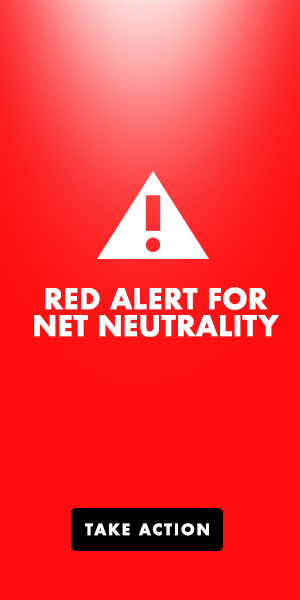Net Neutrality

We support access to free knowledge.
For 20 years, the FCC maintained a bipartisan tradition of supporting and protecting an open internet for Americans. In December, the FCC decided to remove those protections.
This decision gave internet service providers the ability to influence what you see online.
Congress can reverse the FCC's decision.
We need your help. We need your voice.
Link: https://meta.wikimedia.org/wiki/Net_Neutrality

Net Neutrality: What is it?
In the past few months you may have heard something about Net Neutrality, a principle that service providers should treat all internet traffic as equal, and not discriminate on the basis of origin, destination, or type of data. Net Neutrality protects people's access to knowledge by prohibiting these companies from blocking, slowing, or prioritizing data traffic for a fee. Net Neutrality ensures openness that enables us to make knowledge accessible.
Without Net Neutrality rules, internet service providers could become gatekeepers with a financial or political agenda of their own. They could let one news source through fast, and block or slow another. They can accept payment from a particular video streaming service to provide a faster connection for that one service, putting the others at a competitive disadvantage. And, depending on how the law is interpreted, they may be legally allowed to completely block any given site they may choose, or to make sites pay for the privilege of being reachable.
What does it mean for Wikipedia?
These changes concern Wikipedia. The Wikimedia movement is founded on the idea that free knowledge is for everyone. Were it not for an open internet, Wikipedia would not exist in the form that it does, and would not have grown exponentially into a resource accessed all over the world. If access to Wikipedia is slowed, or allowed only as part of a paid premium, this could gravely harm our fundamental mission to provide free access to knowledge for all. Wikipedia relies on people to contribute and collaborate on articles in real time. Restricted access could reduce the quality of articles, break hyperlinks to cited sources, and reduce the diversity of contributors who create and maintain Wikipedia’s content. Forcing readers to pay a premium to access Wikipedia could potentially cause another digital divide, and make knowledge a privilege restricted to those with the means to afford it.
What can we do?
Until December 2017, the FCC had nearly 20 years of bipartisan tradition supporting and protecting an open internet in the U.S. However, the FCC recently decided to repeal existing Net Neutrality rules and gave internet service providers the right to slow down websites for commercial advantage or political advocacy. This would potentially allow ISPs to restrict internet traffic in a variety of ways. They could restrict a user's traffic to a specific list of websites the user paid for, or block access to competing companies websites.
Although the FCC has decided to remove these Net Neutrality protections, there is one last chance to save it. Congress has the power to move to block the FCC's decision through a Congressional Review Act, starting with a vote in the U.S. Senate. It has support. Currently only one more vote is needed there to pass a Senate resolution to preserve Net Neutrality. This may seem daunting, but we as Wikimedians are influential on today's internet because people use and appreciate what we do. While Wikipedia should be non-partisan and non-political, the Wikimedia community must act against threats to our mission. Because we understand that Net Neutrality protections are important for Wikipedia and its sister projects, we support Senate action.
More information
- Fight for the Future: Battle for the Net
- Public Knowledge: "Tell Congress to Use the CRA to Save Net Neutrality"
- Tim Wu: Net Neutrality FAQ
Endorsements